We are so very grateful for all of our CSA members! Providing good food to the community is the reason why we do this every day. For some of you this is your first time ever having a CSA membership with us, for some this is your first time with any farm. I wanted to take a moment to explain how the CSA process works from our side - a little peak into the 'behind the scenes'!
First off you have made an investment - $599 for a full share, $365 for a small share. Over the course of a 22 week season that works out to $27.22 or $16.59 per week respectively. When we pack your shares our goal is to send home with you each week a bag with a market value of either $30 or $18 (about a 10% add-on value). Because we also look at many other factors some weeks are a bit under, some a bit over, but generally we hit right about on target!
Some of those other factors we look at?
1) How much of a given crop do we have available. We want everyone to have a sampling of each item we grow on the farm, sometimes we have an abundant crop (like our spinach right now!) and everyone can have a good amount for a few weeks. Other times we don't have as much and can maybe only include an item in a few shares at a time (like our strawberries right now).
2) Variety. We never want to send you home with only a few items, most weeks small shares have 6-8 different items, full shares have 7-9 items. We also try to not put the same item in week after week. If you have gotten spinach two weeks running you can be fairly confident you won't get any in your next bag. However, a CSA is a share of what is available on the farm so if spinach or squash or cucumbers are the 'in' crop you may receive it for several weeks. Chard and Kale are generally included, but alternate week by week. If you are at one of our 'choice' sites (the farm or farmers market) you may get to choose between the two rather than us choosing for you.
3) Roots vs Greens. During the spring this can be a bit of a hard one! Spring greens are abundant, while root crops are just getting started. Mid summer the opposite is sometimes true - while greens may be struggling in the heat, root crops are out producing. We try to balance the two. We'll send you greens pretty consistently (at least kale/chard) mainly various types of lettuce, but also purlane, cabbage or spinach. Root crops vary, and sometimes you may get a large amount of one type, sometimes smaller amounts of multiple items (i.e. 4 small bunches of beets, carrots, radishes and turnips rather than just 2 large bunches of beets & carrots).
This is all just the things we look at before we start to harvest! We use all of those factors to make our 'best estimate' of what we will need for each CSA day (we have 4 each week, and often they are each slightly different) and create a "Pick List". Once the actual harvesting begins our flexibility (and yours) sometimes gets tested!
Farming is so much about faith and trusting that there will be abundance, also about dealing with issues as they arise - preparing for a CSA is no different. Lets look at a few different crops as examples:
First off you have made an investment - $599 for a full share, $365 for a small share. Over the course of a 22 week season that works out to $27.22 or $16.59 per week respectively. When we pack your shares our goal is to send home with you each week a bag with a market value of either $30 or $18 (about a 10% add-on value). Because we also look at many other factors some weeks are a bit under, some a bit over, but generally we hit right about on target!
Some of those other factors we look at?
1) How much of a given crop do we have available. We want everyone to have a sampling of each item we grow on the farm, sometimes we have an abundant crop (like our spinach right now!) and everyone can have a good amount for a few weeks. Other times we don't have as much and can maybe only include an item in a few shares at a time (like our strawberries right now).
2) Variety. We never want to send you home with only a few items, most weeks small shares have 6-8 different items, full shares have 7-9 items. We also try to not put the same item in week after week. If you have gotten spinach two weeks running you can be fairly confident you won't get any in your next bag. However, a CSA is a share of what is available on the farm so if spinach or squash or cucumbers are the 'in' crop you may receive it for several weeks. Chard and Kale are generally included, but alternate week by week. If you are at one of our 'choice' sites (the farm or farmers market) you may get to choose between the two rather than us choosing for you.
3) Roots vs Greens. During the spring this can be a bit of a hard one! Spring greens are abundant, while root crops are just getting started. Mid summer the opposite is sometimes true - while greens may be struggling in the heat, root crops are out producing. We try to balance the two. We'll send you greens pretty consistently (at least kale/chard) mainly various types of lettuce, but also purlane, cabbage or spinach. Root crops vary, and sometimes you may get a large amount of one type, sometimes smaller amounts of multiple items (i.e. 4 small bunches of beets, carrots, radishes and turnips rather than just 2 large bunches of beets & carrots).
This is all just the things we look at before we start to harvest! We use all of those factors to make our 'best estimate' of what we will need for each CSA day (we have 4 each week, and often they are each slightly different) and create a "Pick List". Once the actual harvesting begins our flexibility (and yours) sometimes gets tested!
Farming is so much about faith and trusting that there will be abundance, also about dealing with issues as they arise - preparing for a CSA is no different. Lets look at a few different crops as examples:
- Root crops are a bit of a mystery to harvest - you can't really see what you are going to get! When we have pulled a few carrots or beets as 'test subjects' and think the crop is ready to be harvested then we add it to our 'pick list' for the week. Sometimes we are overjoyed that each and every carrot or beet is perfectly sized and looks beautiful (rare!), but more often than not there are some that we harvest that we feel are not good enough (too big/small, damaged in some way) for our customers. Without going into to much of food waste issues and what is 'good enough' (I'll go into that in a different post) we then have to look at how much is actually usable from the harvest and adjust our packing accordingly. This may mean that we intended to put a full sized bunch of carrots (6-7) in each share, but find they are just not big enough or some are damaged so that we can only do a 3-4 carrots per person.
- Beans, Peas, Asparagus, Strawberries, Raspberries etc . . . again, very difficult to make an exact judgement on how much is available. It is easy enough to look at a row of pea plants and say 'Yes, there are peas ready to pick!' But a little harder to look and estimate how many pounds are ready per 150 foot row! So again - we harvest, with a goal in mind of how much we need for that day to give say . . . every small share member a half pound of peas and every full share member a pound. Once we have picked what is ready then we adjust and pack accordingly.
- Greens are as I said generally abundant, however there can be challenges there as well! Most crops are continually replanted throughout the season, this is especially true with greens. The hope is that by replanting every couple of weeks that we will have a steady harvest. Generally that works fine. Many greens do not like it too hot, so extra hot may cause fast growth and a crop to be ready before its expected time. If it is too wet greens can get mushy or become havens for slugs. We have had an abundance of spinach this last couple of weeks because even though we spaced out our 3 plantings as warm as it was they were all ready to be harvested.
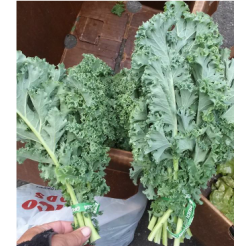
As for sizes of items that go into each bag or box: Small shares are meant for 1-2 people, large for 3-4 people. If you are a family of 2 but primarily eat veggies then a two person share may not be enough! For some 4 person families that don't eat a lot of veggies a large share is overwhelming. You have to look at what your family specifics are to make a choice. Small shares usually receive smaller bunches than what you see on our market stands, the bunches there are considered 'full sized' and are what is used in our Full shares. To the right is an example of bunch sizes for kale - small share on the left, full share on the right.
Below I have broken down the three samples pictured at the top of this post to give you a detailed example of what goes into an actual share.
Hope this helps everyone to better understand how CSA's work. And remember each week is different and if you ever have questions or concerns feel free to email or call!
- Celeste
Below I have broken down the three samples pictured at the top of this post to give you a detailed example of what goes into an actual share.
Hope this helps everyone to better understand how CSA's work. And remember each week is different and if you ever have questions or concerns feel free to email or call!
- Celeste
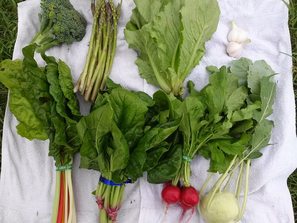
Small Share (June 3rd, 2015) = 18.62
Kholrabi $1.50
Radishes $2.50
Spinach $3.00
Chard $1.50
Lettuce $3
Broccoli (1/2 lb) $2
Asparagus (1/2 lb) $3.12
Garlic (1/4 lb) $2.00
Kholrabi $1.50
Radishes $2.50
Spinach $3.00
Chard $1.50
Lettuce $3
Broccoli (1/2 lb) $2
Asparagus (1/2 lb) $3.12
Garlic (1/4 lb) $2.00
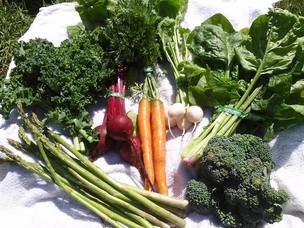
Small Share (June 11th, 2015) = $17.62
Kale $1.50
Beets $1.50
Carrots $1.50
Turnips $1.50
Spinach $3.00
Asparagus (1/2 lb) $3.12
Broccoli (1/2 lb) $2
Pint of strawberries (not pictured) $3.50
Kale $1.50
Beets $1.50
Carrots $1.50
Turnips $1.50
Spinach $3.00
Asparagus (1/2 lb) $3.12
Broccoli (1/2 lb) $2
Pint of strawberries (not pictured) $3.50
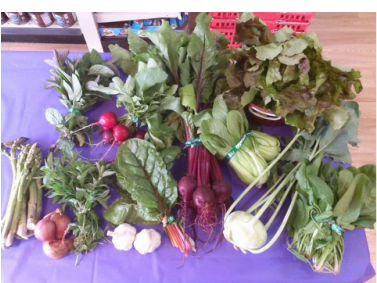
Full Share (May 30th, 2015) = $30.75
Asparagus (1lb) $6.25
Shallots (1/2 lb) $2.00
Herb (1 of 2 pictured) $1.50
Radishes $2.50
Beets $3.00
Bok Choy $3.00
Lettuce $3.00
Spinach $3.00
Kohlrabi $1.50
Chard $3.00
Garlic (1/4lb) $2.00
Asparagus (1lb) $6.25
Shallots (1/2 lb) $2.00
Herb (1 of 2 pictured) $1.50
Radishes $2.50
Beets $3.00
Bok Choy $3.00
Lettuce $3.00
Spinach $3.00
Kohlrabi $1.50
Chard $3.00
Garlic (1/4lb) $2.00
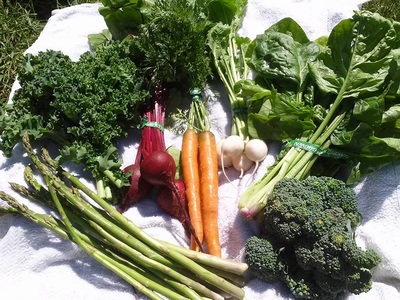
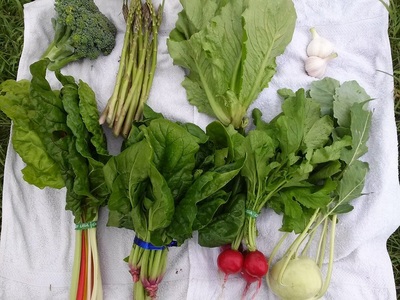
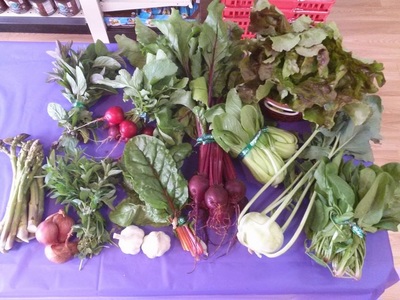
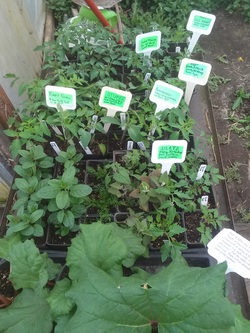
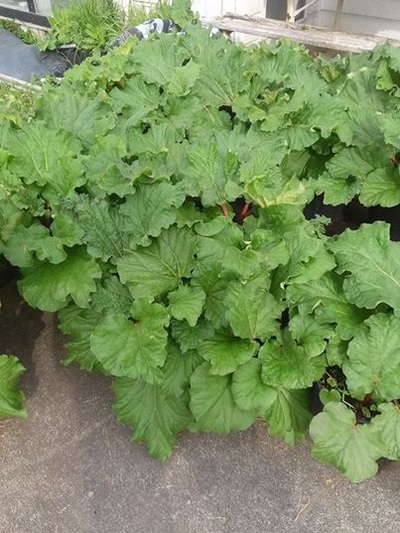
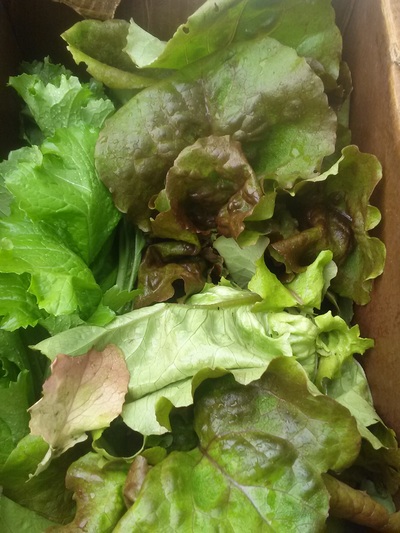
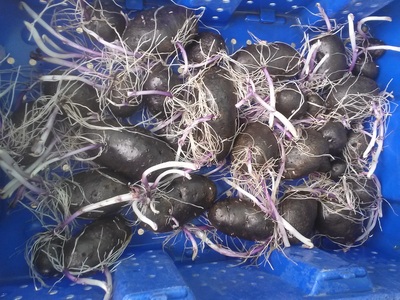
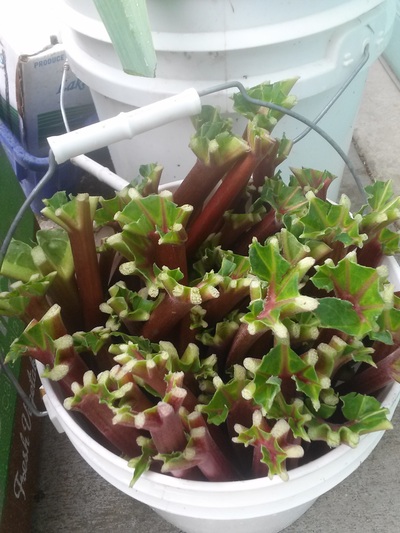
 RSS Feed
RSS Feed
